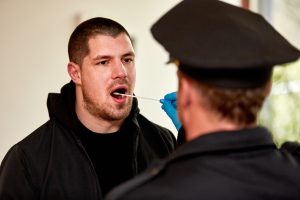 The ever-growing number of states which have legalized either medical marijuana or recreational marijuana has created a number of issues for law enforcement and the justice system. Chief among those issues is the challenge of enforcing laws against operating a vehicle under the influence of marijuana. In an effort to overcome this challenge, the Norwegian company Drauger developed the DrugTest 5000. This system uses a mouth swab, taken roadside, to help determine if a driver is under the influence of marijuana or other drugs. The DrugTest 5000 has been in use in Norway since 2015 and has seen growing use in the United States. This test, however, is probably not the solution for law enforcement’s problems.
The ever-growing number of states which have legalized either medical marijuana or recreational marijuana has created a number of issues for law enforcement and the justice system. Chief among those issues is the challenge of enforcing laws against operating a vehicle under the influence of marijuana. In an effort to overcome this challenge, the Norwegian company Drauger developed the DrugTest 5000. This system uses a mouth swab, taken roadside, to help determine if a driver is under the influence of marijuana or other drugs. The DrugTest 5000 has been in use in Norway since 2015 and has seen growing use in the United States. This test, however, is probably not the solution for law enforcement’s problems.
Articles Posted in DUI/OVI blood/breath/urine tests
U.S. Supreme Court Delivers Disappointing DUI Decision
As discusse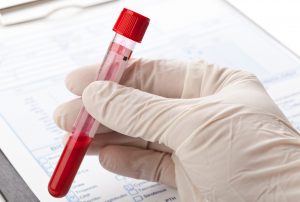 d previously in this space, we have been eagerly awaiting the Supreme Court’s decision in Mitchell v. Wisconsin. The Court set out to determine whether Wisconsin’s Implied Consent statute requires police to obtain a search warrant before getting a blood sample from an unconscious DUI suspect. The state of Wisconsin argued that Mitchell, through the state’s Implied Consent statute, had already consented to the blood draw, thereby removing the requirement for a warrant. Alternatively, they argued this should simply be viewed as an exercise of the State’s power to imposes conditions on a person’s privilege to operate a vehicle on Wisconsin’s roads.
d previously in this space, we have been eagerly awaiting the Supreme Court’s decision in Mitchell v. Wisconsin. The Court set out to determine whether Wisconsin’s Implied Consent statute requires police to obtain a search warrant before getting a blood sample from an unconscious DUI suspect. The state of Wisconsin argued that Mitchell, through the state’s Implied Consent statute, had already consented to the blood draw, thereby removing the requirement for a warrant. Alternatively, they argued this should simply be viewed as an exercise of the State’s power to imposes conditions on a person’s privilege to operate a vehicle on Wisconsin’s roads.
Ohio Prosecutes DUI/OVI Marijuana Even If Driving Isn’t Impaired
 Ohio and Pennsylvania are two states which still prosecute drivers for DUI / OVI marijuana, even if the marijuana metabolites in the driver’s system are not affecting the person’s ability to drive. The Philadelphia District Attorney’s office recently announced it will not prosecute cannabis DUIs unless the driver has amounts of psychoactive THC which affect driving. Ohio prosecutors should consider implementing this policy.
Ohio and Pennsylvania are two states which still prosecute drivers for DUI / OVI marijuana, even if the marijuana metabolites in the driver’s system are not affecting the person’s ability to drive. The Philadelphia District Attorney’s office recently announced it will not prosecute cannabis DUIs unless the driver has amounts of psychoactive THC which affect driving. Ohio prosecutors should consider implementing this policy.
High Court Hears Oral Argument In Third Case Involving Warrantless Blood Test
 The United States Supreme Court recently heard oral arguments in the case of Mitchell v. Wisconsin. As this blog discussed previously, this the third case in a series of cases dealing with whether the police can take a DUI/OVI suspect’s blood without a search warrant. The questions and statements from the bench during the oral argument may telegraph how each justice views the issue. However, in our experience, it is difficult to predict the outcome of a case based on the oral arguments.
The United States Supreme Court recently heard oral arguments in the case of Mitchell v. Wisconsin. As this blog discussed previously, this the third case in a series of cases dealing with whether the police can take a DUI/OVI suspect’s blood without a search warrant. The questions and statements from the bench during the oral argument may telegraph how each justice views the issue. However, in our experience, it is difficult to predict the outcome of a case based on the oral arguments.
Officer Obtains Urine Test Result From Nurse: DUI Dismissed
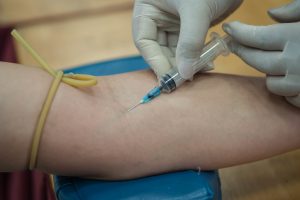 Brynn Campbell was involved in a head on-crash which killed the 83-year-old woman driving the other car. Campbell was taken to the hospital, and hospital staff performed a urine test. Although Campbell showed no obvious signs of impairment, a police officer went to the hospital and asked the nurse for the urine test results. The results showed Campbell’s alcohol level was well over the limit, according to the Global News. The officer then obtained a search warrant to obtain Campbell’s urine samples and have them tested. Campbell was charged with vehicular homicide. She was acquitted by the trial court, and the prosecution appealed.
Brynn Campbell was involved in a head on-crash which killed the 83-year-old woman driving the other car. Campbell was taken to the hospital, and hospital staff performed a urine test. Although Campbell showed no obvious signs of impairment, a police officer went to the hospital and asked the nurse for the urine test results. The results showed Campbell’s alcohol level was well over the limit, according to the Global News. The officer then obtained a search warrant to obtain Campbell’s urine samples and have them tested. Campbell was charged with vehicular homicide. She was acquitted by the trial court, and the prosecution appealed.
Preview: Third Episode In Trilogy Addressing Blood Tests And Search Warrants
 Just as Hollywood has produced some good movies in trilogies, the United States Supreme Court has produced some good case law in trilogies. The Court addressed the right to confront crime lab analysts with the trinity of Bullcoming, Melendez-Diaz and Williams. On the issue of the need for a warrant to draw blood from a DUI suspect, two-thirds of the triad have been completed: McNeely and Birchfield. The triumvirate is about to be consummated with Mitchell v. Wisconsin.
Just as Hollywood has produced some good movies in trilogies, the United States Supreme Court has produced some good case law in trilogies. The Court addressed the right to confront crime lab analysts with the trinity of Bullcoming, Melendez-Diaz and Williams. On the issue of the need for a warrant to draw blood from a DUI suspect, two-thirds of the triad have been completed: McNeely and Birchfield. The triumvirate is about to be consummated with Mitchell v. Wisconsin.
Intoxilyzer 8000 Resurrected For Use In Ohio DUI / OVI Cases
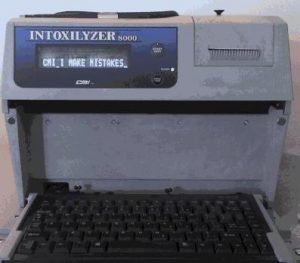 I thought it was dead. In the jurisdictions where I handle OVI cases, I had not seen the Intoxilyzer 8000 used for years. To my surprise, I recently received discovery materials which showed my client’s breath test was done on an I-8000. Given the challenges faced by this machine when it was first brought to life in Ohio, I thought the State may let it rest in peace.
I thought it was dead. In the jurisdictions where I handle OVI cases, I had not seen the Intoxilyzer 8000 used for years. To my surprise, I recently received discovery materials which showed my client’s breath test was done on an I-8000. Given the challenges faced by this machine when it was first brought to life in Ohio, I thought the State may let it rest in peace.
Constitutional Limitations On Crime Lab Reports In Ohio DUI / OVI Cases

The last post in this blog described how crime lab reports are used in Ohio DUI / OVI cases. In a nutshell: a lab technician issues a report identifying the quantity of alcohol or drugs in a person’s blood or urine, and that report is given to the prosecutor. Ohio legislation requires the prosecutor to provide the report to the defense attorney. Ohio legislation, however, is not the only law impacting the use of these reports. The Constitutions of Ohio and the United States also provide limitations on the use of crime lab reports in Ohio DUI / OVI cases.
Using Crime Lab Reports In Ohio DUI / OVI Cases
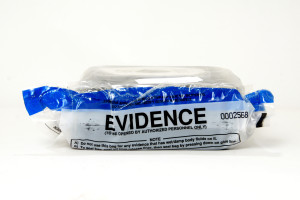 Although Ohio courtrooms may not seem as dramatic and intriguing as those on C.S.I., crime laboratory tests are regularly a part of Ohio criminal cases. In Ohio DUI / OVI cases, and in drug-related cases, crime lab technicians use scientific tests to identify drugs. The lab techs write reports about the analyses and sometimes testify at trial about the tests. A recent case in an Ohio appellate court discusses the detailed procedure for using crime lab reports in Ohio DUI / OVI and criminal trials.
Although Ohio courtrooms may not seem as dramatic and intriguing as those on C.S.I., crime laboratory tests are regularly a part of Ohio criminal cases. In Ohio DUI / OVI cases, and in drug-related cases, crime lab technicians use scientific tests to identify drugs. The lab techs write reports about the analyses and sometimes testify at trial about the tests. A recent case in an Ohio appellate court discusses the detailed procedure for using crime lab reports in Ohio DUI / OVI and criminal trials.
What Does It Mean To “Witness” A Urine Sample In Ohio DUI / OVI Cases?

Most police officers probably do not go to work hoping to witness a suspect provide a urine sample. It’s likely not one of those things they go home and share with their family and friends. But it’s one of those things Ohio law requires in OVI cases. If a suspect is arrested and asked to provide a urine sample, an Ohio Department of Health regulation states, “The collection of the urine specimen must be witnessed”. The precise meaning of “witnessed” was the subject of a recent case in an Ohio court of appeals.
 Columbus OVI/DUI Attorney Blog
Columbus OVI/DUI Attorney Blog

